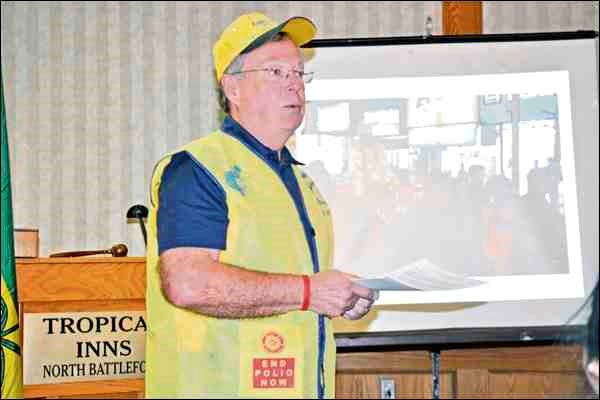It was a mammoth effort to stamp out polio that Harvey Walker took part in during February.
The Battleford resident was in Delhi, India and vicinity. He was one of the vaccinators connected to Rotary International's participation in India's National Immunization Days Feb. 24 and 25.
The National Immunization Days are held "to eradicate polio from the Indian sub-continent," Walker told Battlefords Rotary members at a luncheon in April at the Tropical Inn.
Walker was one of many Rotary volunteers from around the world who joined the effort to administer polio vaccinations to children in India, as Rotary continues their fight to eradicate the disease around the world.
It's a fight opponents of polio are winning. The efforts in India have been a remarkable success story.
India is no longer polio-endemic, as the World Health Organization has declared the country has been free of the disease from any wild source since 2011.
That is an incredible accomplishment in a country with 1.2 billion residents that still suffers from widespread poverty and disease.
Despite those obstacles, polio is basically gone from the country. The only cases in India recently have involved those who entered the country from elsewhere, and those have been met with quick response.
Walker described the rapid response in one village to one such threat involving someone who moved in from Nigeria, as vaccinators descended into the community and immunized everyone.
Walker gave local Rotary members a sense of the massive effort against polio in India, and an immunization campaign that can only be described as staggering in scope.
He described the logistics of the National Immunization Days effort across India. In all there were 709,000 vaccination booths, 2,500,000 vaccinators, 1,170,000 vaccination teams, 155,000 supervisors with 155,000 vehicles, 225 million doses of polio vaccine, 6.3 million icepacks to keep all those doses of polio cold in the two million vaccine carry bags, 209 million homes visited and 172 million children immunized in one day. Rotary made up around 200 or 300 of those who participated, said Walker.
During National Immunization Days, Walker took part in administering oral polio vaccinations to children under five years of age. This was accomplished by squeezing two liquid drops out of a small vial of vaccine into a child's mouth.
"That's all there is to it," Walker said of the vaccinations. "But it's exciting."
Walker noted there were many street signs to alert people to the blitz. He reported he was welcomed enthusiastically by residents there, who opened their doors to allow him in to conduct the vaccinations.
He showed pictures of one such vaccination at an itinerant cattle-herder camp.
The vaccination effort also took Walker through a wealthier district in Delhi with his group.
He described many instances of Indian people making generous offers to stay for tea or food, only to have to turn those down to move on to the next home.
For Walker, his 12-day trip to India in February was more than simply a chance to help eradicate polio from the world. He also took in the unique sights and sounds of India.
He and other Rotary members paid their own way for the trip, without any financial subsidies from the Rotary organization.
When he got to Delhi, a massive city of 11 million residents, he was met by Drs. Mini and Mahesh Khurana of North Battleford. Both are from India originally and happened to be there visiting family for a few days early on in Walker's trip.
"He wanted to see those parts of Delhi which otherwise he couldn't have seen," said Mini, who was at the Rotary luncheon. Walker got a chance to be shown around the bustling Indian city.
They visited a handcraft fair with 930 booths, a once-a-year event that featured artisans from around India showing and selling their creations.
That event also featured a group of dancers who invited participants to join in. One of those who took part was Walker himself. "For some reason I wasn't invited back," he said.
Once the rest of his group arrived in Delhi, Walker went touring for the next few days. He travelled by bus to Agra to see various sights including the Taj Mahal, which he described as "breathtaking."
He also described the general scenes on the streets and in the various communities during his travels. There were interesting animals to see in the streets, he said. Walker noted in Agra there were "monkeys everywhere" at a terrace at one mausoleum, and cows and pigs in the streets.
Walker also spoke about a memorable trip to Jaipur to a historic centuries old astrological observatory, as well as to the Jaipur Knee, Limb and Foot facility, which "can fit a person with a full leg prosthesis" for just $50.
In North America, the cost of a leg prosthesis would run upwards of $10,000. Walker said he asked the director why this technology hasn't been brought to North America and noted the "risk of a lawsuit" was a reason. Just the cost of defending against such a lawsuit would bankrupt them, he was told.
He also described a tour to a school funded by the local Rotary chapter and the difference it made for children there.
It was a memorable and eye-opening trip for Walker, who saw for himself the challenges and hectic pace of life in India - a country he is keen on returning to.
"It's dirty; poverty is in your face all the time. The people are gracious and welcoming - except people who are trying to sell you something," said Walker.
"But the non-vendors, as I say, are gracious and we were recognized as welcome visitors."




